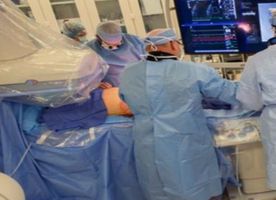Coronary Artery Disease (CAD) Treatment in Vietnam
Search and Compare the Best Clinics and Doctors at the Lowest Prices for Coronary Artery Disease (CAD) Treatment in Vietnam

Our partner clinics in are accredited by the following associations



































































































































No Time?
Tell us what you're looking for and we'll reach out to the top clinics all at once
WHY US?



































































































































No Time?
Tell us what you're looking for and we'll reach out to the top clinics all at once
What does a Coronary Artery Disease (CAD) Treatment Procedure Involve?
In Vietnam, the Coronary Artery Disease (CAD) Treatment is administered through detailed and precise treatment strategies. The procedure commonly encompasses a mix of medications, lifestyle modifications, and occasionally surgical procedures. The medication might be formulated with antiplatelet drugs, drugs lowering cholesterol, beta-blockers, calcium channel blockers, nitrates, and angiotensin-converting enzyme (ACE) inhibitors. For acuter cases, surgical interventions such as angioplasty, stent placement, coronary artery bypass surgery (CABG), or minimally invasive heart surgery may be necessary.
How Long Should I Stay in Vietnam for a Coronary Artery Disease (CAD) Treatment Procedure?
The length of residence in Vietnam for a Coronary Artery Disease (CAD) Treatment typically rests on the intricacies of the treatment plan. If the regimen includes a surgical procedure, the stay could span several weeks, encompassing pre-operative evaluations, the surgery itself, and the recuperation period post-surgery. The entire timeframe will also involve routine follow-up visits to oversee progress and manage potential postoperative complications. Adhering to your doctor's instructions is key to ensuring a hassle-free stay and successful recuperation.
What's the Recovery Time for Coronary Artery Disease (CAD) Treatment Procedures in Vietnam?
The recovery time for Coronary Artery Disease (CAD) Treatment procedures in Vietnam relies on numerous elements including the nature of the treatment, the individual's general health condition, and adherence to post-treatment guidelines. Patients under medication therapy can anticipate gradual betterment spanning weeks to months. Conversely, if a surgical procedure is performed, the recovery could range from several weeks to a few months. By incorporating lifestyle modifications such as consistent exercise and a nutritious diet, this process can be hastened.
What sort of Aftercare is Required for Coronary Artery Disease (CAD) Treatment Procedures in Vietnam?
Post-surgical aftercare subsequent to a Coronary Artery Disease (CAD) Treatment procedure in Vietnam is crucial to the recuperation journey. This may involve regular medical appointments, medication modifications, and adherence to lifestyle alterations like sustaining a nutritious diet, staying physically active, quitting smoking, restricting alcohol consumption, and managing stress effectively. Constant interaction with healthcare providers and dedication to self-care can considerably impact both the recovery speed and success.
What's the Success Rate of Coronary Artery Disease (CAD) Treatment Procedures in Vietnam?
Coronary Artery Disease (CAD) Treatment procedures in Vietnam boast a commendable success rate, attributed to the progression in medical technology and refined health care protocols. A large number of patients witness considerable symptomatic relief and enhanced quality of life following the treatment. However, the precise success rate may fluctuate among individuals, influenced by factors such as general health, the severity of the condition, the treatment type, and dedication to altering lifestyle habits.
Are there Alternatives to Coronary Artery Disease (CAD) Treatment Procedures in Vietnam?
Indeed, Coronary Artery Disease (CAD) Treatment procedures in Vietnam do have alternatives which could involve modifications in lifestyle, medicinal therapy, or sometimes, supplementary treatments. For example, practices like yoga, meditation, and other mindfulness exercises can assist in stress management, playing a vital part in managing CAD. Nonetheless, prior to beginning any new treatment scheme, it's critical to converse about these alternatives with your healthcare provider.
This information has been accurately sourced and verified by a medical professional for its accuracy, however, we strongly recommend you to consult with your doctor before pursuing medical procedures overseas.










